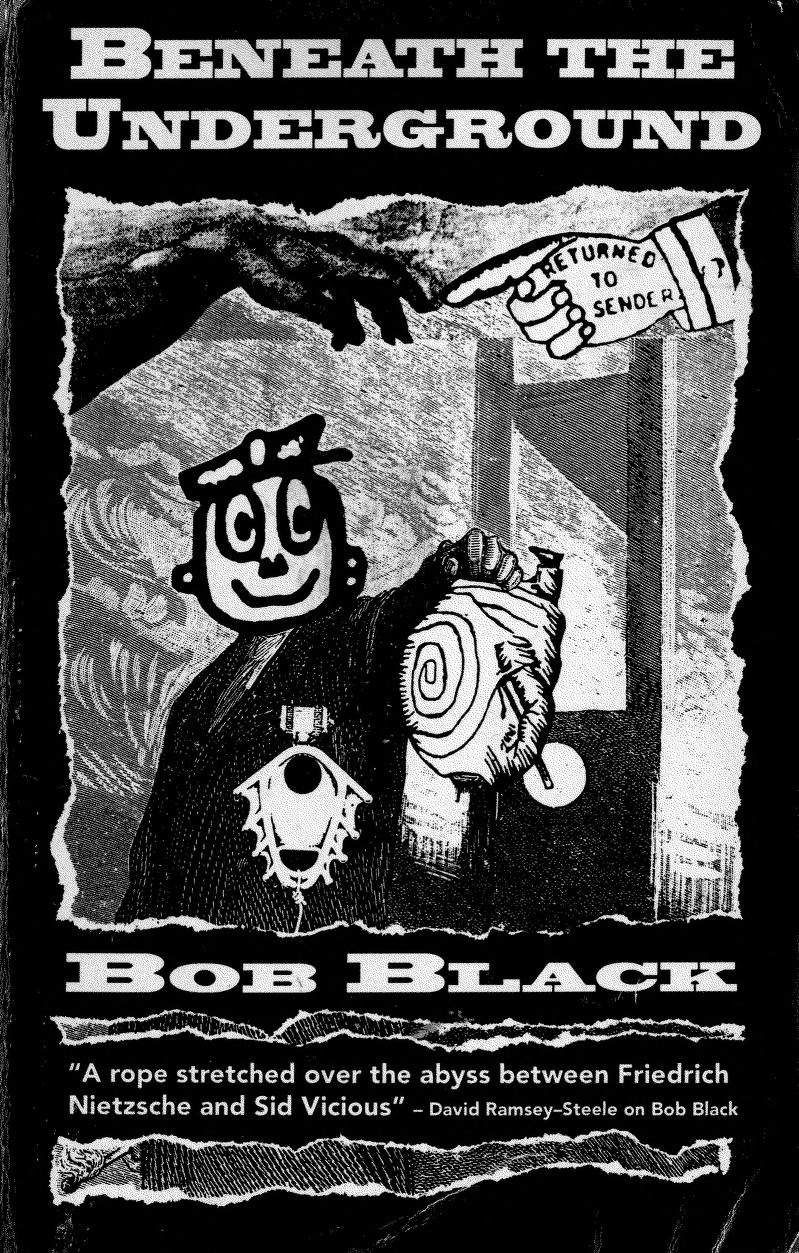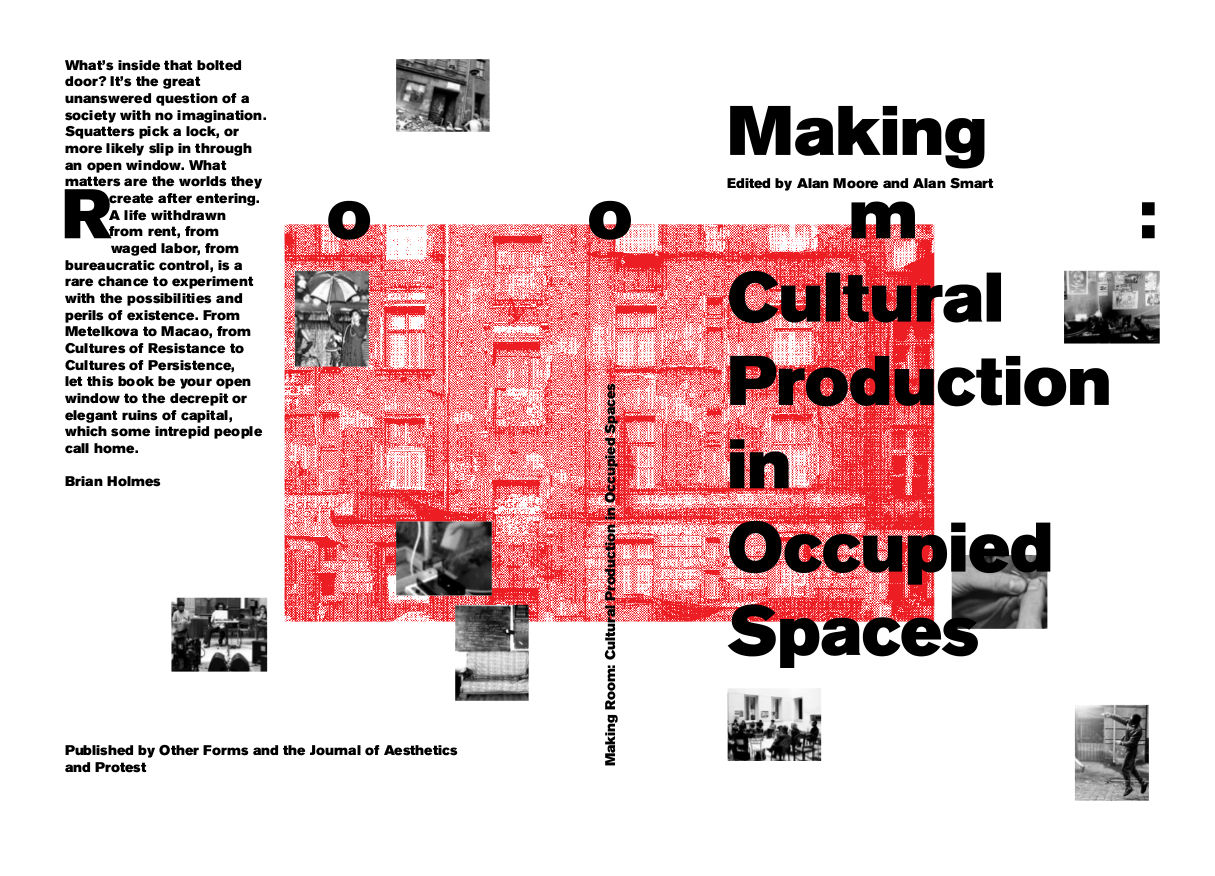Bob Black: Beneath the Underground (1994)
Filed under book | Tags: · anarchism, artists book, magazine, publishing, zine culture

“Beneath the Underground is an in-depth exploration, from within, of a cultural phenomenon named by Bob Black as the ‘marginals milieu.’ You could also call it the do-it-yourself subculture. It consists of self-publishers of micro-circulation ‘zines’ and other self-produced art, music, pamphlets, and posters.”
Publisher Feral House, Portland, OR, 1994
ISBN 9780922915217, 0922915210
x+190 pages
via whatwillittake
Alan Moore, Alan Smart (eds.): Making Room: Cultural Production in Occupied Spaces (2015)
Filed under book | Tags: · activism, anarchism, art, counterculture, cultural production, diy, social movements, squatting

“An anthology of voices from the post-1968 squatting movement in Europe and beyond. It focuses on creative production and cultural innovation driven by squats. Squatting is certainly a tactic which has enabled a tremendous body of collective culture work to be done, and new kinds of lives to be lived. Making Room lays it out in the words of those who did it and study it.
The dark matter undercommons of disobedient culture surveyed in this book begins its roam in a theoretical introduction that includes autonomist theory, ‘monster institutions’ and simple economic justice. It moves from north to south, portraying by country some specific local conditions of an international movement.”
With contributions by Miguel Ángel Martínez López, Alan W. Moore, Stevphen Shukaitis, Universidad Nómada, Tino Buchholz, Vincent Boschma, Geert Lovink, Alan Smart, Aja Waalwijk, Jordan Zinovich, Britta Lillesøe,Tina Steiger, Mikkel Bolt Rasmussen, x-Chris, Kasper Opstrup, Azomozox, Ashley Dawson, Sarah Lewison, Azomozox, Nina Fraeser, Julia Ramírez Blanco, Tobias Morawski, Eliseo Fucolti, Gianni Piazza, Assembly of Teatro Valle, Patrick Nagle, Emanuele Braga, Margot Verdier, Vincent Prieur, Jon Lackman, Jacqueline Feldman, Julia Lledin, Elisabeth Lorenzi, Julia Lledinm, Stephen Luis Vilaseca, La Casa Invisible, Stephen Luis Vilaseca, Yasmin Ramirez, Gregory Lehmann, Sutapa Chattopadhyay, Jasna Babic, Tristan Wibault, Galvao Debelle dos Santos, E.T.C. Dee, Spencer Sunshine, Maxigas, and mujinga.
Co-published by Journal of Aesthetics & Protest and Other Forms, October 2015
Designed by Other Forms
Translation Milena Ruiz Magaldi and Jeannette Petrik
Open access
ISBN 9780979137792
355 pages
PDF (27 MB)
PDF (G Drive, from publisher)
Greil Marcus: Lipstick Traces: A Secret History of the Twentieth Century (1989–) [EN, ES, TR]
Filed under book | Tags: · 1968, anarchism, art, avant-garde, communism, dada, history, lettrism, marxism, music, nazism, popular culture, punk, situationists, surrealism

“Greil Marcus began work on this book out of a fascination with the Sex Pistols: that scandalous antimusical group, invented in London in 1975 and dead within two years, which sparked the emergence of the culture called punk. “I am an antichrist!” shouted singer Johnny Rotten—where in the world of pop music did that come from? Looking for an answer, with a high sense of the drama of the journey, Marcus takes us down the dark paths of counterhistory, a route of blasphemy, adventure, and surprise.
This is no mere search for cultural antecedents. Instead, what Marcus so brilliantly shows is that various kinds of angry, absolute demands—demands on society, art, and all the governing structures of everyday life—seem to be coded in phrases, images, and actions passed on invisibly, but inevitably, by people quite unaware of each other. Marcus lets us hear strange yet familiar voices: of such heretics as the Brethren of the Free Spirit in medieval Europe and the Ranters in seventeenth-century England; the dadaists in Zurich in 1916 and Berlin in 1918, wearing death masks, chanting glossolalia; one Michel Mourre, who in 1950 took over Easter Mass at Notre-Dame to proclaim the death of God; the Lettrist International and the Situationist International, small groups of Paris—based artists and writers surrounding Guy Debord, who produced blank-screen films, prophetic graffiti, and perhaps the most provocative social criticism of the 1950s and ’60s; the rioting students and workers of May ’68, scrawling cryptic slogans on city walls and bringing France to a halt; the Sex Pistols in London, recording the savage “Anarchy in the U.K.” and “God Save the Queen.”
Although the Sex Pistols shape the beginning and the end of the story, Lipstick Traces is not a book about music; it is about a common voice, discovered and transmitted in many forms. Working from scores of previously unexamined and untranslated essays, manifestos, and filmscripts, from old photographs, dada sound poetry, punk songs, collages, and classic texts from Marx to Henri Lefebvre, Marcus takes us deep behind the acknowledged events of our era, into a hidden tradition of moments that would seem imaginary except for the fact that they are real: a tradition of shared utopias, solitary refusals, impossible demands, and unexplained disappearances. Written with grace and force, humor and an insistent sense of tragedy and danger, Lipstick Traces tells a story as disruptive and compelling as the century itself.”
Publisher The Belknap Press of Harvard University Press, Cambridge/MA, 1989
Twentieth Anniversary Edition, 2009
ISBN 0674034805, 9780674034808
496 pages
via missionsamurai
Radio interview with author (30 min, KCRW, 1989)
Interview with author (Simon Reynolds, Los Angeles Review of Books, 2012)
Reviews: Simon Reynolds (Melody Maker, 1989), Jerome McGann (London Review of Books, 1989), Jon Erickson (Discourse, 1989-1990), Steve Redhead (Popular Music, 1990), Libero Andreotti (J Architectural Education, 1996).
Lipstick Traces (English, 1989/2009, EPUB, 5 MB)
Rastros de carmín. Una historia secreta del siglo XX (Spanish, trans. Damián Alou, 1993, 13 MB)
Ruj Lekesi: Yirminci Yüzyılın Gizli Tarihi (Turkish, trans. Gürol Koca, 1999, 29 MB)

